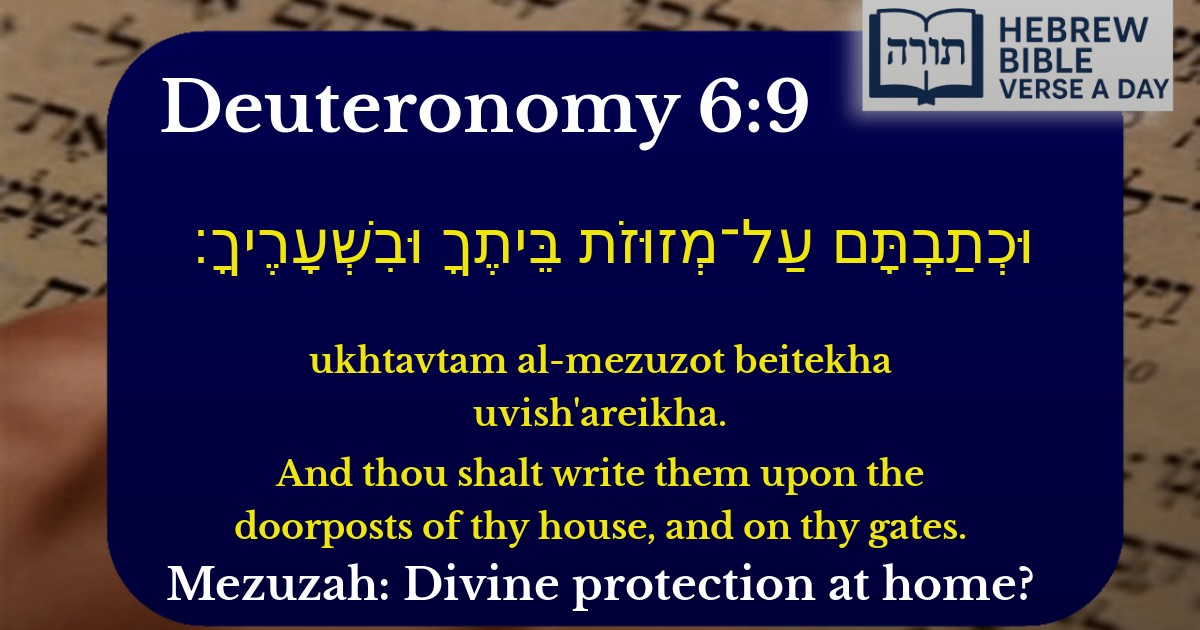Join Our Newsletter To Be Informed When New Videos Are Posted
Join the thousands of fellow Studends who rely on our videos to learn how to read the bible in Hebrew for free!
Hebrew Text
וּכְתַבְתָּם עַל־מְזוּזֹת בֵּיתֶךָ וּבִשְׁעָרֶיךָ׃
English Translation
And thou shalt write them upon the doorposts of thy house, and on thy gates.
Transliteration
Ukhtavtam al-mezuzot beitekha uvish'areikha.
Hebrew Leining Text
וּכְתַבְתָּ֛ם עַל־מְזֻז֥וֹת בֵּיתֶ֖ךָ וּבִשְׁעָרֶֽיךָ׃ {ס}
Parasha Commentary
📚 Talmud Citations
This verse is quoted in the Talmud.
📖 Menachot 34a
The verse is discussed in the context of the mitzvah of mezuzah, specifically regarding the proper placement and writing of the mezuzah on doorposts.
📖 Yoma 11a
The verse is referenced in a discussion about the sanctity of the home and the importance of fulfilling the commandment of mezuzah.


Understanding the Mitzvah of Mezuzah
The verse (Devarim 6:9) commands the Jewish people to inscribe the words of the Shema "upon the doorposts of thy house, and on thy gates." This mitzvah is the basis for the practice of affixing a mezuzah to the doorposts of Jewish homes. Rashi explains that the term "וּבִשְׁעָרֶיךָ" (and on thy gates) extends this obligation beyond private dwellings to include the gates of cities and courtyards as well.
The Content of the Mezuzah
According to Halacha (Rambam, Hilchot Mezuzah 5:1), the mezuzah must contain two parshiyot from the Torah:
These passages emphasize the fundamental principles of Jewish faith: the unity of Hashem, the obligation to love and serve Him, and the concept of reward and punishment.
Halachic Requirements
The Talmud (Menachot 33a) discusses numerous details regarding proper mezuzah placement:
Rambam (Hilchot Mezuzah 6:13) emphasizes that one must be careful with this mitzvah as it is an obligation that is constantly in effect.
Spiritual Significance
The Zohar (Shelach 170b) teaches that the mezuzah serves as spiritual protection for the home. The name "Shaddai" (Almighty) written on the back of the parchment is an acronym for "Shomer Daltot Yisrael" (Guardian of the doors of Israel). The Sefer HaChinuch (Mitzvah 423) explains that the mezuzah reminds us of Hashem's presence whenever we enter or leave our homes.
Contemporary Application
Rabbi Moshe Feinstein (Igrot Moshe, Yoreh De'ah 1:181) addresses modern questions about mezuzah placement on various types of doors in contemporary dwellings. The Shulchan Aruch (Yoreh De'ah 285-291) provides comprehensive guidelines for checking and maintaining mezuzot to ensure they remain kosher.